| Listing 1 - 10 of 39 | << page >> |
Sort by
|
Book
ISBN: 3110528673 3110530775 9783110530773 9783110530780 3110530783 3110528533 9783110528534 3110528533 Year: 2018 Publisher: Oldenbourg, [Germany]
Abstract | Keywords | Export | Availability | Bookmark
 Loading...
Loading...Choose an application
- Reference Manager
- EndNote
- RefWorks (Direct export to RefWorks)
Experiencing the dimension that lies beyond our empirical grasp of the world has always been a challenge for human beings, for it can expose the limitations of our agency. Such experience, while potentially terrifying, can also furnish a basis for religious faith or hope of a better future. The intercultural essays in this volume analyze ways of dealing with the beyond, including magic, religion, myth, and all-promising utopias.
Ethnohistory. --- Ethnohistorical method --- Historical anthropology --- Historical ethnology --- Anthropology --- Ethnology --- Methodology
Book
ISBN: 9004370978 900437096X 9789004370975 9789004370968 9789004370951 9004370951 9789004370968 Year: 2018 Publisher: Leiden Boston
Abstract | Keywords | Export | Availability | Bookmark
 Loading...
Loading...Choose an application
- Reference Manager
- EndNote
- RefWorks (Direct export to RefWorks)
A Man Comes from Someplace is a story of a lost world, a story in history of a multi-generational Jewish family from a shtetl in Ukraine before WWI. As cultural study, the narrative draws upon the oral stories of the author’s father, family letters, eyewitness accounts, immigration papers, et cetera, and cultural research. The narrative becomes a transformative space to re-present story as performance, a meta-narrative, and an auto-ethnography for the author to reflect upon the effects of the stories on her own life, as daughter of a survivor, and as teacher/scholar. Summerfield raises questions about immigration, survival, resilience, place and identity, how story functions as antidote to trauma, a means of making sense of the world, and as resistance, the refusal to be silenced or erased, the insistence we know the past and remember those who came before. In 2011, she found her way back to the place her family came from in Ukraine. The book is now being read by students in their ESL classes in Novokoonstantinov, Ukraine.
Jews --- Ethnohistory. --- Families --- Family history (Sociology) --- Ethnohistorical method --- Historical anthropology --- Historical ethnology --- Anthropology --- Ethnology --- History. --- Methodology
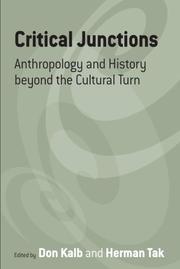
ISBN: 1845450086 1845450299 1782389628 Year: 2005 Publisher: New York, N.Y. Berghahn
Abstract | Keywords | Export | Availability | Bookmark
 Loading...
Loading...Choose an application
- Reference Manager
- EndNote
- RefWorks (Direct export to RefWorks)
The “cultural turn” has been a multifarious and pervasive phenomenon in Western universities and modes of social knowledge since the early 1980s. This volume focuses on the conjunction of two disciplines where both the analytic promises as well as the difficulties involved in the meeting of humanist and social science approaches soon became obvious. Anthropologists and historians have come together here in order to recapture, elaborate, and criticize pre-Cultural Turn and non-Cultural Turn modes of analysing structures of experience, feeling, subjectivity and action in human societies and to highlight the still unexploited possibilities developed among others in the work of scholars such as Norbert Elias, Max Gluckman, Eric Wolf, E.P. Thompson and Raymond Williams.
Ethnology. Cultural anthropology --- History as a science --- Anthropology --- Ethnohistory. --- Historiography. --- Methodology. --- Ethnohistory --- Historiography --- Historical criticism --- History --- Authorship --- Ethnohistorical method --- Historical anthropology --- Historical ethnology --- Ethnology --- Methodology --- Criticism
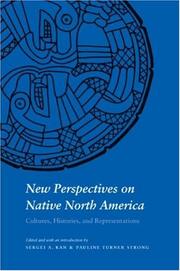
ISBN: 1280374705 9786610374700 080325363X 9780803253636 0803227736 0803278306 9780803227736 9780803278301 9781280374708 Year: 2006 Publisher: Lincoln University of Nebraska Press
Abstract | Keywords | Export | Availability | Bookmark
 Loading...
Loading...Choose an application
- Reference Manager
- EndNote
- RefWorks (Direct export to RefWorks)
In this volume some of the leading scholars working in Native North America explore contemporary perspectives on Native culture, history, and representation. Written in honor of the anthropologist Raymond D. Fogelson, the volume charts the currents of contemporary scholarship while offering an invigorating challenge to researchers in the field. The essays employ a variety of theoretical and methodological approaches and range widely across time and space. The introduction and first section consider the origins and legacies of various strands of interpretation, while the second part examines the relationship among culture, power, and creativity. The third part focuses on the cultural construction and experience of history, and the volume closes with essays on identity, difference, and appropriation in several historical and cultural contexts. Aimed at a broad interdisciplinary audience, the volume offers an excellent overview of contemporary perspectives on Native peoples.
Ethnology --- Ethnohistory --- Indians of North America --- Ethnohistorical method --- Historical anthropology --- Historical ethnology --- Anthropology --- Social life and customs. --- History --- Customs --- Methodology --- Fogelson, Raymond. --- North America --- Turtle Island (Continent)
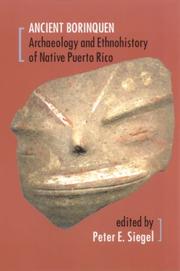
ISBN: 0817381503 9780817381509 0817352384 9780817352387 0817314717 0817352384 9780817314712 9780817352387 Year: 2005 Publisher: Tuscaloosa University of Alabama Press
Abstract | Keywords | Export | Availability | Bookmark
 Loading...
Loading...Choose an application
- Reference Manager
- EndNote
- RefWorks (Direct export to RefWorks)
Native American cultures of Puerto Rico prior to the arrival of the Spanish in 1493.A book on the prehistory of a modern geopolitical entity is artificial. It is unlikely that prehistoric occupants recognized the same boundaries and responded to the same political forces that operated in the formation of current nations, states, or cities. Yet, archaeologists traditionally have produced such volumes and they
Ethnohistory --- Indians of the West Indies --- Ethnohistorical method --- Historical anthropology --- Historical ethnology --- Anthropology --- Ethnology --- Indigenous peoples --- History. --- Antiquities. --- Methodology --- Puerto Rico --- Antiquities --- History
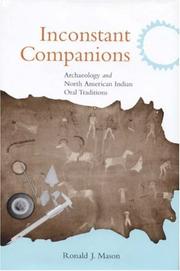
ISBN: 0817381414 9780817381417 0817315330 9780817315337 Year: 2006 Publisher: Tuscaloosa, AL University of Alabama Press
Abstract | Keywords | Export | Availability | Bookmark
 Loading...
Loading...Choose an application
- Reference Manager
- EndNote
- RefWorks (Direct export to RefWorks)
One of the most significant theoretical issues in contemporary American archaeology-the role of oral tradition in scientific research. Ronald J. Mason explores the tension between aboriginal oral traditions and the practice of archaeology in North America. That exploration is necessarily interdisciplinary and set in a global context. Indeed, the issues at stake are universal in the current era of intellectual ""decolonization"" and multiculturalism. Unless committed to writing, even the most esteemed utterances are inevitably f
Ethnohistory --- Oral tradition --- Indians of North America --- Tradition, Oral --- Oral communication --- Folklore --- Oral history --- Folk-lore, Indian --- Ethnohistorical method --- Historical anthropology --- Historical ethnology --- Anthropology --- Ethnology --- History. --- Methodology
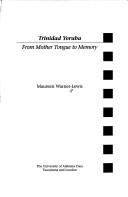
ISBN: 0817383182 9780817383183 9780817355821 0817355820 0817307273 9780817307271 Year: 1996 Publisher: Tuscaloosa University of Alabama Press
Abstract | Keywords | Export | Availability | Bookmark
 Loading...
Loading...Choose an application
- Reference Manager
- EndNote
- RefWorks (Direct export to RefWorks)
A deeply informed Afrocentric view of language and cultural retention under slavery. Maureen Warner-Lewis offers a comprehensive description of the West African language of Yoruba as it has been used on the island of Trinidad in the southern Caribbean. The study breaks new ground in addressing the experience of Africans in one locale of the Africa Diaspora and examines the nature of their social and linguistic heritage as it was successively retained, modified, and discarded in a European-dominated island community.
Yoruba language --- Aku language --- Eyo language --- Nago language --- Yariba language --- Kwa languages --- Dialects --- Ethnohistory --- Ethnohistorical method --- Historical anthropology --- Historical ethnology --- Anthropology --- Ethnology --- Methodology
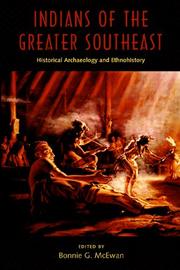
ISBN: 0813023076 9780813023076 0813017785 0813020867 Year: 2000 Publisher: Gainesville, Fla. University Press of Florida
Abstract | Keywords | Export | Availability | Bookmark
 Loading...
Loading...Choose an application
- Reference Manager
- EndNote
- RefWorks (Direct export to RefWorks)
Indians of North America --- Ethnohistory --- Archaeology and history --- Historical archaeology --- History and archaeology --- History --- Ethnohistorical method --- Historical anthropology --- Historical ethnology --- Anthropology --- Ethnology --- History. --- Antiquities. --- Methodology --- Southern States
Book
ISBN: 1438469411 9781438469416 9781438469393 Year: 2018 Publisher: Albany
Abstract | Keywords | Export | Availability | Bookmark
 Loading...
Loading...Choose an application
- Reference Manager
- EndNote
- RefWorks (Direct export to RefWorks)
The concept of civilization has a long but checkered history in anthropology, and anthropological materials have been of great importance for the development of civilizational analysis in historical sociology. Anthropology and Civilizational Analysis brings these diverse fields together and explores a wide range of topics pertaining to civilization, from classical theories to contemporary rhetorical discourses, including detailed case studies of concrete practices documented through archival and ethnographic research. While many scholars and the wider public still think of civilization in simplistic terms, viewing it in terms of Enlightenment notions of progress and evolution to higher stages, others have pluralized the term only to create essentialized units which are only tenuously linked to historical processes. In this book contributors use dynamic approaches, including those rooted in the seminal writings of Émile Durkheim and Marcel Mauss, opening up the dimension of civilization as an important complement to other key terms such as society and culture in social science and historical analysis.
Civilization --- Comparative civilization. --- Historical sociology. --- Ethnohistory. --- Ethnohistorical method --- Historical anthropology --- Historical ethnology --- Anthropology --- Ethnology --- History --- Sociology --- Civilization, Comparative --- Philosophy and civilization --- Philosophy. --- Methodology
Book
ISBN: 2728837562 2728837910 Year: 2013 Publisher: Paris : Éditions Rue d’Ulm,
Abstract | Keywords | Export | Availability | Bookmark
 Loading...
Loading...Choose an application
- Reference Manager
- EndNote
- RefWorks (Direct export to RefWorks)
Quels sont les processus de transformation d'une forme symbolique ? Comment s'importe-t-elle et s'intègre-t-elle dans des traditions et des rituels qui lui sont étrangers ? Pierre Déléage nous livre ici une belle étude de cas. Son enquête, à la croisée de l'anthropologie et de l'histoire, a pour terrain les relations qui s'établirent, au cours des XVIIe et XVIIIe siècles, entre des missionnaires catholiques et les Micmacs, groupe amérindien peuplant les côtes atlantiques de l'actuelle frontière séparant le Canada des États-Unis. Chez les Micmacs, la croix était un signe d'alliance diplomatique, guerrier et chamanique. Confrontés à cette situation, les missionnaires français usent d'un syncrétisme pédagogique pour propager la croix chrétienne. Quant aux « hiéroglyphes » micmacs, méthode d'inscription tout à fait exceptionnelle, ils se constituent à l'intersection des traditions pictographiques autochtones et de l'écriture alphabétique apportée par les missions. Cet ouvrage démontre la force d'innovation produite par les interactions entre des systèmes symboliques différents. Il décrit et explique comment l'hétérogénéité culturelle construit l'efficace des objets et des rituels, assure leur propagation et aboutit à l'invention de traditions nouvelles pour un groupe humain donné à un moment de son histoire.
Micmac Indians --- Crosses --- Micmac language --- Missionaries --- Symbolic anthropology. --- Rites and ceremonies. --- Writing. --- History. --- Historical anthropology --- French Canada --- Indians --- 17th-18th centuries --- Mi'kmaq --- Mi'kmaw language
| Listing 1 - 10 of 39 | << page >> |
Sort by
|

 Search
Search Feedback
Feedback About UniCat
About UniCat  Help
Help News
News